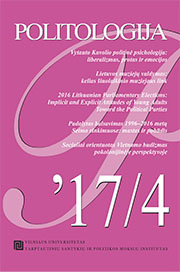Vytauto Kavolio politinė psichologija: Liberalizmas, protas ir emocijos
Vytautas Kavolis’ Political Psychology: Liberalism, Reason and Emotions
Author(s): Alvydas NoreikaSubject(s): Government/Political systems, Political psychology
Published by: Vilniaus universiteto leidykla & VU Tarptautinių santykių ir politikos mokslų institutas
Summary/Abstract: This article deals with the Lithuanian-American political thinker’s Vytautas Kavolis’ approach to the interpretation of emotions in liberalism. It is stated in his texts that pure liberalism depreciates the meaning of emotions in human life. This depreciation is explained by the rationalistic nature of pure liberalism. Preferring reason, it dismisses emotions as an irrelevant factor in human motivation. The historical liberal tradition of the recognition of the important role of emotions in human life is attributed to influence of Romanticism, in which emotions take a central position. According to Kavolis, pure liberalism – today, as in the past – could only overcome its one-sidedness with the help of a Romantic worldview. It is argued that the thinker’s understanding of the role of emotions in human life has its roots in his scientific activities – studies of Freudianism and Neo-Freudianism. It is stated that on the basis of the psychoanalytic idea of unconsciousness, Kavolis contends that pure liberalism fails in dissociating itself from emotions. They still lay in its subconscious level. Pure liberalism unintentionally expresses personality in revolt against any authority. This article explains how Kavolis’ approach to the relationship of liberalism and emotions influences his whole political theory and scientific enterprise.
Journal: Politologija
- Issue Year: 2017
- Issue No: 4 (88)
- Page Range: 3-35
- Page Count: 33
- Language: Lithuanian

